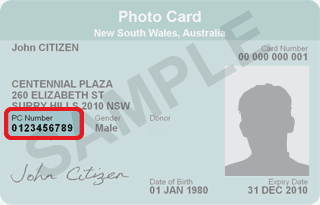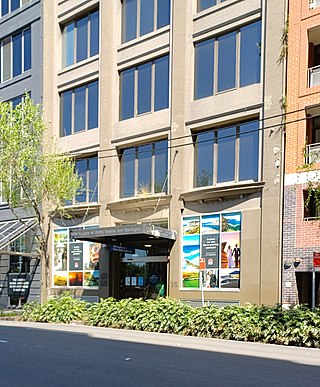An identity document is any document that may be used to prove a person's identity. If issued in a small, standard credit card size form, it is usually called an identity card, or passport card. Some countries issue formal identity documents, as national identification cards that may be compulsory or non-compulsory, while others may require identity verification using regional identification or informal documents. When the identity document incorporates a person's photograph, it may be called photo ID.

.au is the Internet country code top-level domain (ccTLD) for Australia. It was created on 5 March 1986. Domain name policy is managed by .au Domain Administration (auDA). As of July 2018, the registry is operated by Afilias.
A national identification number, national identity number, or national insurance number or JMBG/EMBG is used by the governments of many countries as a means of tracking their citizens, permanent residents, and temporary residents for the purposes of work, taxation, government benefits, health care, and other governmentally-related functions.

The Hong Kong Special Administrative Region Passport is a passport issued only to permanent residents of Hong Kong who also hold Chinese citizenship. In accordance with the Basic Law of the Hong Kong Special Administrative Region, since the transfer of sovereignty on 1 July 1997, the passport has been issued by the Immigration Department of the Government of Hong Kong under the authorisation of the Central People's Government of the People's Republic of China. As the official languages of Hong Kong are Chinese and English, the passport is printed bilingually in both Chinese and English. In addition, unlike Chinese passport which can be issued by Chinese consulates abroad, the Immigration Department is the only issuing authority for HKSAR passports.

The NSW Photo Card is a voluntary photo card issued by the Service NSW in New South Wales, Australia. It is credit-card sized and bears the cardholder’s photo, signature, name, address and date of birth.

An Australian passport is a travel document issued by the Commonwealth of Australia to individuals holding any form of Australian nationality. It grants the bearer international passage in accordance with visa requirements and serves as both a form of identification and proof of Australian citizenship. It also facilitates access to consular assistance from Australian embassies around the world. Passports are issued in accordance with the Australian Passports Act 2005 by the Australian Passport Office, an agency of the Department of Foreign Affairs and Trade (DFAT). As of July 2023, Australian citizens had visa-free or visa on arrival access to 186 countries and territories, ranking the passport sixth in the world for travel freedom according to the Henley Passport Index.

The visa policy of Australia deals with the requirements that a foreign national wishing to enter Australia must meet to obtain a visa, which is a permit to travel, to enter and remain in the country. A visa may also entitle the visa holder to other privileges, such as a right to work, study, etc. and may be subject to conditions.

Visitors to the United States must obtain a visa from one of the U.S. diplomatic missions unless they are citizens of one of the visa-exempt or Visa Waiver Program countries.

The Macao Special Administrative Region of the People's Republic of Chinapassport is a passport issued to Chinese citizens who are permanent residents of the Chinese Special Administrative Region of Macau.

Taxis in Australia are highly regulated by each Australian state and territory, with each state and territory having its own history and structure. In December 2014, there were 21,344 taxis in Australia. Taxis in Australia are required to be licensed and are typically required to operate and charge on a fitted taximeter. Taxi fare rates are set by State or Territory governments. A vehicle without a meter is generally not considered to be a taxi, and may be described, for example, as a hire car, limousine, carpool, etc. Most taxis today are fueled by liquid petroleum gas. A2B Australia owns and operates the Cabcharge payment system, which covers 98% of taxis in Australia, and operates one of Australia's largest taxi networks.

Driver licences in Australia refer to the official permit required for a person to legally drive a motor vehicle in Australia. The issue of driver licences, alongside the regulation and enforcement of road use, are all managed by state and territory governments.
An Aviation Security Identification Card (ASIC) is an Australian identification card that shows that the holder of the card has undergone a security check and is suitable to enter a secure area of an Australian Airport. Security checks are performed by AusCheck and include a criminal records check undertaken by the Australian Federal Police, a security assessment conducted by the Australian Security Intelligence Organisation (ASIO) and an unlawful non-citizen check conducted by the Department of Home Affairs. An ASIC is required for all personnel working at a security controlled airport in Australia. Personnel requiring access to a secure airport who are under the age of 18 are required to display an ASIC however issuing bodies can not apply for a security check. An ASIC has to be renewed every two years except for someone who has applied for an ASIC before they turned 18 in which case an ASIC is valid until 6 months after the person's 18th birthday. Only people with an operational need to enter a secure airport may apply for an ASIC. The goal of the ASIC is not just to prevent terrorist activities at airports but to ensure aircraft, equipment and facilities can not be tampered with.
Alcohol laws of Australia are laws that regulate the sale and consumption of alcoholic beverages. The legal drinking age is 18 throughout Australia. The minimum age for the purchase of alcoholic products in Australia is 18. A licence is required to produce or sell alcohol.

Visa requirements for Australian passport holders are administrative entry restrictions by the authorities of other states placed on citizens of Australia entering with an Australian passport.
The Lebanese identity card is a compulsory Identity document issued to citizens of the Republic of Lebanon by the police on behalf of the Lebanese Ministry of Interior or in Lebanese embassies/consulates (abroad) free of charge. It is proof of identity, citizenship and residence of the Lebanese citizens.

A driver's license, driving licence, or driving permit is a legal authorization, or the official document confirming such an authorization, for a specific individual to operate one or more types of motorized vehicles—such as motorcycles, cars, trucks, or buses—on a public road. Such licenses are often plastic and the size of a credit card.
Australian state and territory issued identity photo cards are photo identification cards issued by the States and Territories of Australia. While the drivers license is similar to the photo identity card, the photo identity card is treated separately here.
Australia does not have a national identity card. Although Australia Post, which is government owned, does have a nationwide identity card called a Keypass but it is not accepted everywhere and you may need alternate forms of ID. Various Identity documents of Australia may be used or required to prove a person's identity instead of a national identity card, whether for government or commercial purposes such as:
Digital identity is used in Australia by residents to validate who they are over digital media, such as over the Internet.

Civil registration in Australia of births, deaths and marriages as well other life events is carried out and maintained by each state and territory in Australia, in an office called a Registry of Births, Deaths and Marriages. It is compulsory in each jurisdiction, though the procedures and information recorded varies between jurisdictions. Access to information on the register is restricted by period or relationship, and is usually provided at a fee in the form of certificates. Nowadays, certificates can also be ordered online, and will be posted to the applicant, often with some delay.











